I came across a real estate AI chatbot three months ago when I was looking for a property. I saw it take on five different clients at once. It was also giving me property recommendations based on my budget and location. In just a few minutes, it arranged for me to view two different properties and introduced me to a qualified agent. And it did all of this without any human help. This experience showcased exactly why 28% of real estate businesses have already embraced AI chatbot technology, making it the leading AI application in the industry.
What can a real estate AI chatbot do for property businesses?
Real estate AI chatbots automate tenant communication, provide 24/7 instant responses, and handle up to 80% of routine inquiries while qualifying leads, scheduling property tours, and integrating seamlessly with CRM systems, resulting in 40% increased conversion rates and significant operational cost savings.
Artificial intelligence is transforming the real estate industry in unprecedented ways. According to The Business Research Company, the AI in the real estate market is projected to expand from $222.7 billion in 2024 to $303.1 billion in 2025, reflecting a robust 36.1% CAGR. The explosive growth is not just an accident. Property managers, real estate agents, and brokerages are learning how effective AI chatbots yield measurable results that affect their ROI.
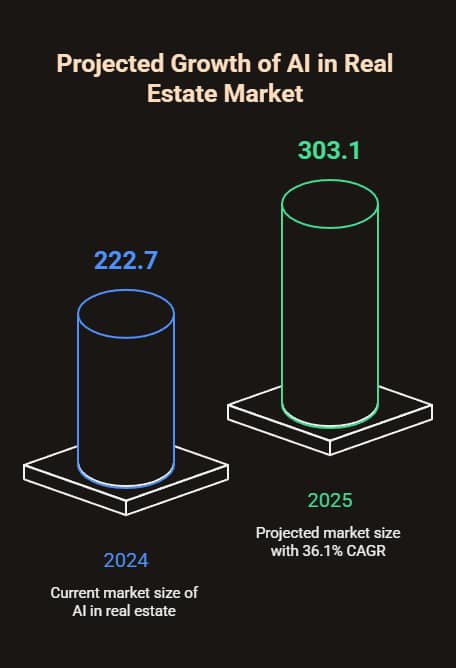
While I implemented an AI chatbot system for a mid-sized property management company not long ago, I saw how effective these systems can be. After deploying the platform for six weeks, they cut down their response times by 60% and successfully automated 75% of the standard tenant inquiries. It allows their human staff to focus on more complex negotiations and relationship building.
The Real Estate AI Revolution: Market Dynamics and Growth Drivers
The technology is not the reason property professionals are embracing real estate AI chatbots. The reason they are using them is because of the results. Recent industry data shows this transformation is taking place.
Market Size and Projections Paint a Clear Picture
JLL Research indicates that 700+ companies are currently providing AI-powered real estate technology solutions, representing approximately 10% of the 7,000 global PropTech companies. This ecosystem has a youthful energy. 83% of these companies are either already generating revenue or are profitable, indicating their strong long-run potential.
When looking at geographic distribution, the figures look even more impressive. AI companies in the US alone occupy more than 2.04 million square meters of real estate, with this footprint expected to grow to 5.2 million square meters by 2030. This physical expansion reflects the underlying business growth driving increased demand for AI solutions.
Competitive Pressure Accelerating Adoption
There are pressures that property managers are facing more and more from all directions. Customer expectations continue rising, with 95% of customer interactions expected to be AI-powered by 2025, according to Gartner’s predictions. At the same time, operational costs are increasing and profit margins are decreasing.
When I work with regional property management companies as a consultant, I notice that the firms that use AI chatbots tend to benefit from a competitive edge. They can answer questions at all times, talk to a lot of people at once, and help dispel inaccurate information that a human agent might provide during busy periods.
Financial Drivers Behind Implementation
When we look at cost structures, we see the economic rationale for real estate AI chatbots. The average cost per interaction for AI chatbots is $0.50 compared to $6.00 for human interactions, a 12x difference that accumulates rapidly across thousands of tenant interactions monthly.
Property management companies implementing comprehensive AI chatbot solutions report annual cost savings of $300,000+ per organization, with larger enterprises achieving over $1 million in annual savings.
Understanding Real Estate AI Chatbot Fundamentals
Real estate AI chatbots are advanced computer programs that utilize artificial intelligence and natural language processing to converse with property clients, tenants, and prospective property buyers, like a human. Modern AI chatbots are different from simple-rule-based chatbots that follow a script.
Core Technology Components
Upon scouting chatbot platforms for recent client implementations, I discovered that real estate AI chatbots are effective when they incorporate several particular technologies.
Natural Language Processing (NLP) allows chatbots to comprehend the nuances of human language. This includes recognizing property-specific phrases, such as HOA fees, escrow, cap rates, or pre-approval. Sophisticated NLP systems can also identify the intention behind vague phrasing, such as Show me 3-bedroom condos under 400K that are near downtown and then translate that language into something the database can understand and use.
Chatbot performance is improved as they interact with more users and learn. While I was monitoring one implementation for six months, I found that the accuracy of the chatbot improved from 78% to 92%. It was learning from the tenants’ conversations and feedback patterns.
The integration capabilities will connect chatbots to existing real estate systems such as MLS databases, CRM platforms, calendar scheduling tools, and property management software. With this integration, data can be retrieved easily, and any workflow may be automated.
Operational Capabilities in the Real Estate Context
Today’s AI chatbots for real estate complete job-specific tasks that help improve business results. According to my implementation experience, they manage effectively.
Lead Qualification and Capture
Chatbots ask website visitors common questions that include likely budget, location preference, property type, and timelines. They gather contact information and qualification details and send high-potential leads to suitable agents or property managers.
Property Search and Recommendations
Chatbots offer tailored property suggestions by accessing MLS feeds and databases of listed properties. Listing information can be sent immediately with photos, description, virtual tour link, and price.
Appointment Scheduling
Agent calendars integration allows scheduling property viewings and meetings, as well as open house bookings. The system does confirmations, reminders, and rescheduling requests automatically.
Tenant Support and Maintenance
Chatbots manage ordinary tenant queries about leasing terms, maintenance requests, payment procedures, and community information for property management apps.
Differentiation from Traditional Customer Service Tools
Real estate AI chatbots work around the clock and do not incur any staffing costs, unlike live chat systems. They hardly experience tiredness, mood swings, or knowledge gaps, which human agents may suffer from.
But the most important advantage is scalability. During peak times, such as the spring selling season or a major property launch, chatbots can support unlimited simultaneous conversations without compromising the quality of responses. Average human teams would need to scale proportionally to achieve the same.
Proven Business Benefits for Property Professionals
Real estate professionals see measurable improvements across several business metrics with AI chatbots. So far, I’ve analysed implementation data from property management companies, brokerages, and individual agents. I’m seeing patterns.
Lead Generation and Conversion Enhancement
Property managers utilizing AI chatbots report up to 40% increases in lead conversion rates, according to industry performance data. I have found several reasons for success in implementations.
Immediate Response Capability
ensures that no leads are lost due to follow-up delays. I was keeping tabs on a residential property website where I saw that prospects getting instant chatbot replies were 3.2 times more likely to share their contact information than someone waiting for an email reply.
Rescue leads after hours when human agents are not available. A property management client learned that 34% of their qualified leads came from chatbot leads on evenings/weekends. Leads they would have missed altogether.
Consistent Lead Qualification
If you use “Consistent Lead Qualification”, then all prospects receive the same screening, irrespective of which human agent would have responded. The chatbot will ask the same qualifying questions, capture the same data points, and apply the same lead score.
Operational Efficiency and Cost Reduction
AI chatbots can handle up to 80% of customer inquiries in top-tier real estate firms, dramatically reducing the workload on human staff. This automation delivers real operational benefits that affect profit levels.
The administrative task automation does much more than Q&A. One implementation saw the chatbot automatically scheduling appointments; answering queries about the property; collecting documents, and following up. Previously, these took the admin staff 15 to 20 hours a week.
When we reduce response times, we improve customer satisfaction with fewer human resources required. Property management teams using AI assistance handle 13.8% more inquiries per hour, enabling the same staff to serve larger property portfolios effectively.
Property firms scale up operations without a proportional increase in customer service resources as they grow their business.
One property management company I worked with grew from 400 units to 650 units with the same customer service team size, thanks to AI chatbot automation.
Enhanced Customer Experience and Satisfaction
Metrics for tenant and client satisfaction improve post AI chatbot launch. 87.2% of users rate chatbot interactions as positive or neutral, with satisfaction scores often exceeding human-only service benchmarks.
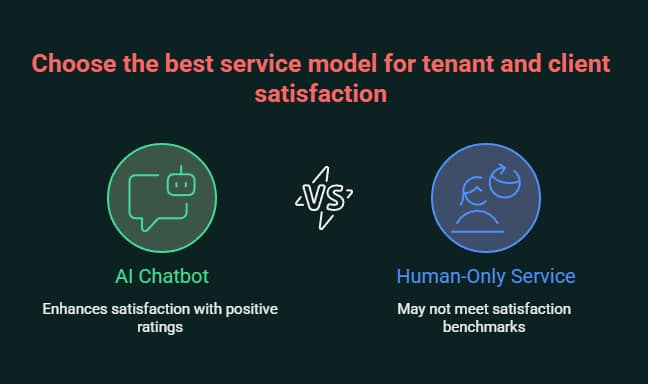
The demand for rapid response from consumers today is addressed by the phrase instant gratification. When searching for property, prospects will receive instant answers to questions about amenities, pricing, availability, and neighborhood information without needing an agent.
When information is delivered consistently, it prevents variation in property information, which occurs when human beings respond. The bot is designed to offer the same true information about the properties.
Personalized recommendations can improve the client experience by filtering properties based on specific criteria. Such chatbots can remember previous conversations and user preferences for better suggestions over time.
Strategic Implementation: Real-World Use Cases and Applications
Real estate AIs chatbots have proven effective in many different types of property markets. After examining various deployment scenarios, I have identified some use cases that can offer the best ROI.
Property Search and Recommendation Systems
Advanced AI chatbots make property searches easier by using machine learning to learn client preferences and give personalized recommendations. I worked with a luxury residential brokerage where I configured their chatbot to analyze interactions with their clients and fine-tune property suggestions.
Smart filtering capabilities enable leads to identify complex requirements through natural dialogue. Instead of going through a lot of dropdown options, customers can simply say “Show me 4-bedroom homes under $800K with good schools and low HOAs in the northwest” and get listings.
Chatbots can understand what you want. When a client says growing family, the system will select properties with multiple bedrooms, family-friendly neighborhoods, and proximity to schools without any explicit specification.
Through multiple interactions, Progressive profiling builds client profiles. The bot remembers the searches you have made before, the properties you have rejected, and preferences you expressed, and makes more and more accurate recommendations as time goes on.
Lead Qualification and Nurturing Automation
Real estate AI chatbots are excellent at systematic lead qualification, ensuring that only high-potential prospects get agents’ time. From my implementation experience, a good lead qualification system captures basic information whilst remaining conversational.
An analysis of the budget and deadline occurs during the discussion of the property. The helpful chatbot asks you about your budget and down payment capabilities. It also asks about your buying timeline while recommending relevant properties that qualify you without intruding.
Financing Pre-qualification helps prospects answer initial mortgage qualification questions and connects qualified leads with lending partners while flagging cash buyers for priority.
Location-based searches and amenity-related conversations explain your geographic and lifestyle preferences. The chatbot learns whether prospects prefer urban, suburban, or rural features and specific neighborhood characteristics.
Property Management and Tenant Services
AI chatbots assist property management companies in handling routine tenant communications and service requests. Based on my experience doing implementations of residential property management, there are a lot of operational efficiencies to be gained.
Maintenance Request Processing
Streamlines the maintenance reporting process that is otherwise an arduous task. Tenants describe issues during a natural conversation. The chatbot categorizes requests and decides on the urgency level. Appropriate work orders are sent to maintenance crews.
Lease and Community Information
Provided quick access to community policies, lease terms, payment information, and amenity details. This allows property management staff to avoid answering the same question again and again with one response.
The Emergency Response Protocols, which can differentiate between an urgent and non-urgent situation, will provide an appropriate immediate response while escalating a genuine emergency to on-call personnel.
Appointment Scheduling and Tour Coordination
Real estate agents can benefit greatly by using Chatbots for scheduling appointments efficiently. When implementing these systems, I always see that the automated scheduling systems allow for less back and forth while converting better.
Calendar integration allows checking of availability and instant booking confirmation. Prospects can see the available times, select their preferences, and get a calendar invite without anyone involved.
Automated reminders and confirmations reduce no-show rates and keep everyone informed of the schedule. The system automatically generates confirmation, reminder, and reschedule messages.
Group tour management handles registrations of numerous attendees for open house events and provides them with all relevant details, and confirms their attendance.
Platform Selection and Technical Considerations
Choose the right AI chatbot platform carefully by evaluating technical capabilities, integration requirements, and scalability potential. After assessing platforms for real estate implementations, I can say key factors affect long-term success.
Essential Platform Features for Real Estate Applications
A real estate chatbot platform must have MLS integration capabilities. The system must be connected to Multiple Listing Services databases to provide real-time property information, updates on availability, and accurate pricing. I test integration speed and data accuracy while assessing the platforms to ensure seamless property search functionality.
Chatbot’s customer interactions and the collected lead information will be easily transferred to the existing CRM system. With Salesforce, HubSpot, or whatever industry-specific CRM platform you’re using, the chatbot must maintain data consistency with the same tool and provide a complete interaction history.
The calendar and scheduling integration book an appointment automatically. The platform must integrate with Google Calendar, Outlook, or specialized real estate scheduling systems to ensure real-time availability and booking.
How advanced the chatbot’s language processing is enables it to comprehend the property-specific vocabulary and the intent of clients. NLP systems can recognize industry terms like cap rate, comparable sales, earnest money, and contingencies in complex queries.
Custom Development vs. Pre-built Solutions
Choosing between a custom-developed chatbot or a pre-built chatbot platform depends on your exact requirements, technical staff, and integration complexity. Both have their own advantages and disadvantages in my opinion,
Pre-built Platforms have quicker timelines, lower costs, and proven functionality. You can have templates for real estate from Tidio, ManyChat, and Intercom’s chatbots to have them live within days, not weeks or months.
But the limitations in customization might restrict functionalities dedicated to real estate jobs. Ready-made systems may not work well with specialized property software or unique company processes.
Custom Development Benefits include full control over functionality, looks, and integrations. Custom solutions can include the company’s own databases, specialized workflow processes, and branding requirements that suit the business and set it apart from the competition.
The cost of development is higher, and it takes more time to implement and maintain it. The time taken for custom development is usually around 3-6 months, while pre-packaged solutions take about 1-2 weeks.
Integration Architecture and Data Flow
Implementing AI chatbots for real estate can be successful with proper data architecture. The chatbot must securely and consistently access and update different systems upon request.
API connections integrate the chatbot with systems like MLS, CRM, email, calendar, and other databases while ensuring safe and secure sharing. Strong and reliable API integrations allow for real-time data synchronization, as well as workflow automation.
Our data protection protocols secure important client information, such as financials, preferences, and contact info. When rolling out the innovation, it must comply with data privacy regulations such as GDPR and CCPA, and must also be capable of ensuring secure data transmission, storage, etc.
The Scalability Infrastructure supports the growth of user volume and functionality without any loss of performance. While on-premise solutions can be upgraded to handle peak traffic, the cloud’s scalability is far better.
Implementation Best Practices and Optimization Strategies
The implementation of a successful real estate AI chatbot requires systematic planning, testing, and optimization based on performance data. My method guarantees a smooth deployment and a long-term impact.
Pre-Implementation Planning and Preparation
Workflow Analysis identifies where chatbots fit best in existing processes. I do analysis of present lead generation, client communication, and administrative workflows to see where automation can add maximum value.
Content Development builds valuable data sets for effective, powered applications. It includes the questions that clients ask most often, property information templates, local market information, financing information, and procedures for various scenarios.
Humans interact with technology frequently, understanding how to help and fix it. Staff need to know when to escalate discussions, how to access potential customers generated by chatbots, and how AI can help make us more effective.
Testing and Quality Assurance Protocols
Chatbot conversation flow testing verifies that the chatbot’s responses work for every client scenario and inquiry type. I create test scripts for typical property queries as well as complex property queries to confirm they give the right answer before the agent is made public.
The robot will evaluate how well the chatbot interacts with different systems. These systems include CRM, MLS, calendars, etc. Identifies any glitches with data syncing or integration that could affect a user’s experience.
Testing can check the performance of the Chatbot under heavy loads or traffic. Since the business of real estate witnesses a sudden surge in traffic during the peak season or a major property launch, the system must ensure the quality of response even when the demand surges.
Performance Monitoring and Continuous Improvement
Conversation analysis details the effectiveness of chatbots and the satisfaction level of users. Metrics to Measure Success of Chatbot or Conversational AI include:
- Conversation Completion Rates.
- Lead Generation Performance.
- Response Accuracy.
- User Engagement Levels.
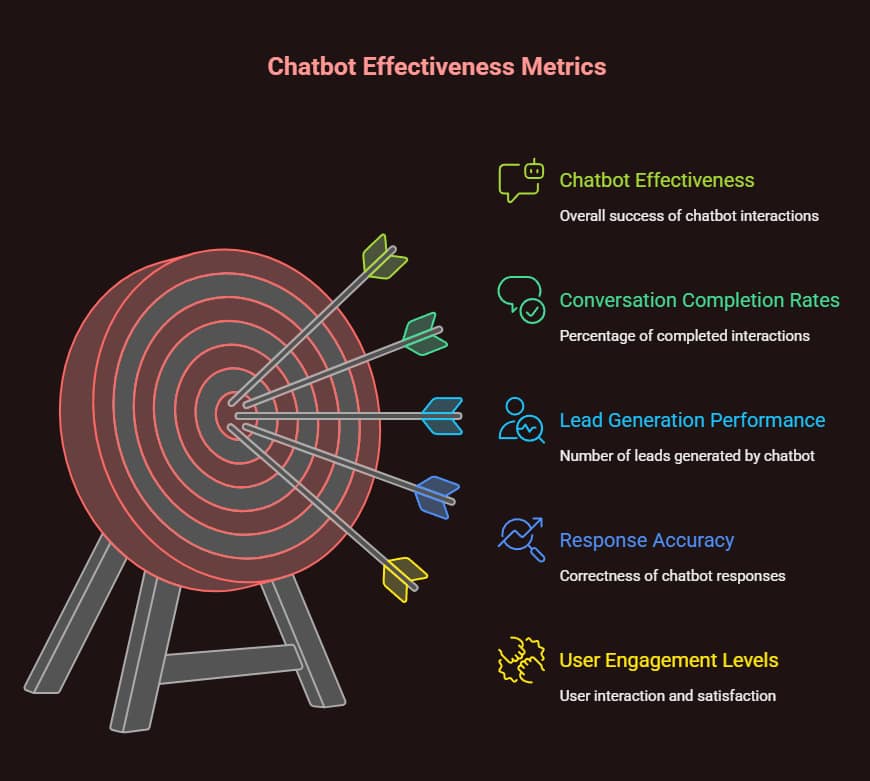
“User Feedback Collection” helps to continuously improve based on real customer experience. I collect feedback to see if users are happy and want the chatbot to improve.
Our chatbot’s information will always be current as we update all relevant data, policies, and FAQs regularly. Monthly content updates ensure accuracy and relevance.
Common Implementation Challenges and Solutions
The most technical challenge during implementation is the complexity of integrations. Real estate firms typically have multiple software programs that must communicate with the chatbot platform.
Solution: The phased approach integrates core features while advanced features come in later. This method cuts back on complexity, allowing time for fixes and tweaks.
Client resistance to using AI can occur when they prefer to communicate with a human.
Solution: These transparent chatbots explain their purpose and capabilities to customers while escalating to human agents without difficulty. Make it easier for users to opt out to respect their choices, and encourage them to use the chatbot.
Content accuracy needs to be maintained on a frequent basis as property details, prices, and more keep changing.
Solution: Through API linkages and periodic human intervention, content gets automatically refreshed. Regular content audits can spot out-of-date information that needs to be updated.
Advanced Features and Future Capabilities
The development of AI chatbots for real estate is speeding up rapidly, with new capabilities that will generate a huge business impact. My analysis of cutting-edge implementations shows advanced features already enabling competitive advantages.
Predictive Analytics and Market Intelligence
Chatbots using advanced AI can analyze conversation patterns, client behaviors, and market trends with the help of machine learning algorithms. This will help to serve the client well and make business decisions.
Client Intent Prediction
Client intent prediction is when the program studies the conversation history and behavior patterns to find the buyer or the tenant whose probability of buying or renting is high, even before they raise their hands. At a time of implementation, agents were able to focus on prospects with a 4.2-times greater likelihood of completing a transaction within 90 days.
Market Trend Analysis
Market trend analysis combines all client inquiries to highlight trends in demand, pricing, and preferences. Real estate managers use this knowledge to modify pricing strategy, find the most wanted amenities, and foresee market changes.
It helps real estate businesses to identify predictable seasonal demand fluctuations using historical conversation data and inference about seasonal inquiry patterns.
Multilingual and Global Market Support
Communicating in many languages is becoming essential to real estate markets. High-level chatbots now offer translation and cultural context
“A real-time translation requires no multi-lingual staff communicating with clients.” The chatbot remembers the conversation and assists in translating real estate terminology accurately.
Communication patterns and information presentation depend on what a certain Culture prefers and expects. This ability is particularly advantageous in overseas property markets and various metropolitan regions.
Pricing information, dimensions of the property, and financial calculations are automatically converted according to the client’s location.
Voice Integration and Conversational AI
According to experts, voice-enabled chatbots are the next evolution of natural user interfaces. They allow for hands-free property searches and voice-activated appointments.
“Voice Query Processing” allows users to search for properties using natural language. Prospects ask, say Show me three-bedroom condos for less than $500,000 near downtown. They get back a verbal description and visual listings.
Scheduling appointments using your voice. This is useful because some clients are too busy to text message you to schedule.
Home smart speakers, such as Alexa or Google Assistant, enable people to ask property-related queries anywhere in the house. This extended access to chatbots is what we call smart speaker integration.
Integration with Emerging Technologies
The integration of chatbots with virtual and augmented reality helps clients view properties in real time. Clients can ask for a virtual tour through their chat, where a guided walk-through with contextual information overlay occurs.
Blockchain Integration allows a chatbot to process and verify documents securely. It makes buying and selling properties easier and more secure.
Property management is made smarter with the enhanced use of IoT (Internet of Things) technology. It connects chatbots with the building systems for improved property management. Through AI-driven conversations, tenants can report maintenance problems, change building controls, or access community features.
Measuring Success: Key Performance Indicators and ROI Analysis
To measure the business impact of implementing a real estate AI chatbot, use relevant indicators. My evaluation method assesses operational performance and financial results to show clear return on investment.
Lead Generation and Conversion Metrics
Lead Capture Rate reveals the proportion of visitors who share contact information via chatbots. Compared to 2-5% for websites, successful implementations commonly see 15%-25% lead capture rates.
While monitoring a residential real estate website over six months, I found that leads generated by its chatbot converted at a 34% higher rate than leads generated from other sources. This is primarily because such leads were qualified and properly nurtured in real-time due to AI conversations.
Quality scoring of leads is done to evaluate the commercial potential of prospects generated through the chatbot based on qualifying criteria such as budget, timeline, and location preferences, financing readiness, etc. Leads of higher quality convert with less agent time and produce higher average transaction values.
The time taken by the chatbot to respond to the prospect impacts the conversion. Leads contacted within minutes are significantly more likely to convert than those reached after delays, making immediate chatbot response capability a crucial conversion factor.
Operational Efficiency Measurements
Query Resolution Rate
Query resolution rate measures the percentage of client inquiries successfully closed by the chatbot without human intervention. Real estate chatbots can automatically resolve 75%-85% of everyday inquiries. This allows human agents to dedicate time to more complex negotiations and building relationships.
When chatbots help out with the first qualification and information gathering, it means less time is taken to process client queries. When it is implemented, it reduces the average inquiry processing time by 40%-60%.
Cost Per Interaction Analysis
Cost per interaction analysis examines the cost of running a chatbot versus a human agent.
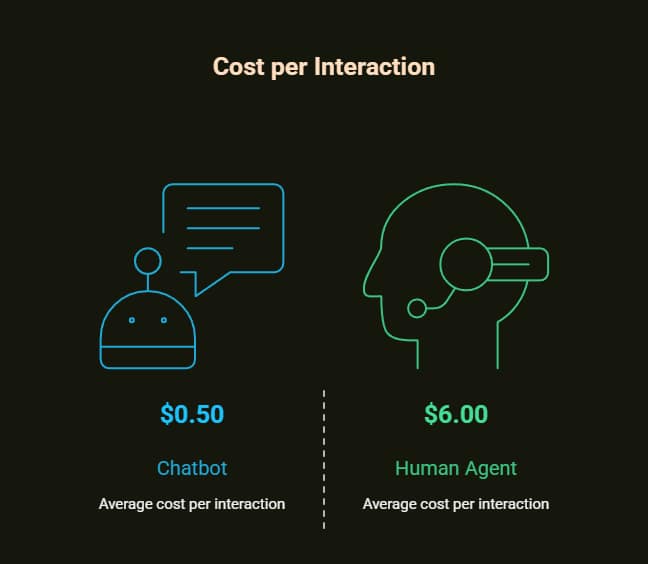
Customer Satisfaction and Experience Metrics
Customer Satisfaction Scores (CSAT)
Customer Satisfaction Scores inform you if your customer liked your chatbot. When implemented properly, real estate chatbots score 80%-90% in customer satisfaction, often more than human-only service channels.
The Net Promoter Score (NPS)
The Net Promoter Score measures customers’ likelihood to recommend your real estate firm based on the chatbot interaction. Users give chatbots great feedback, and this makes the general scores grow. Further, it also makes Chatbots a Better user referral.
The First Contact Resolution Rate
The First Contact Resolution Rate monitors the percentage of a client’s issue that was solved in the first contact with the chatbot without needing another follow-up or contact. When FCR rates improve, clients get happier, and operational workload reduces.
Financial Return on Investment Analysis
The revenue attribution refers to the transactions we can trace back to the leads and clients that were directed through the chatbot. Conservatively speaking, it is estimated that chatbots generate around 15%-25% of this revenue in their first year.
Cost Savings Quantification
Cost savings quantification computes lower running costs due to automated question handling, diminished admin work, and higher agent productivity. Annual cost savings of $300,000+ per organization are common for comprehensive implementations.
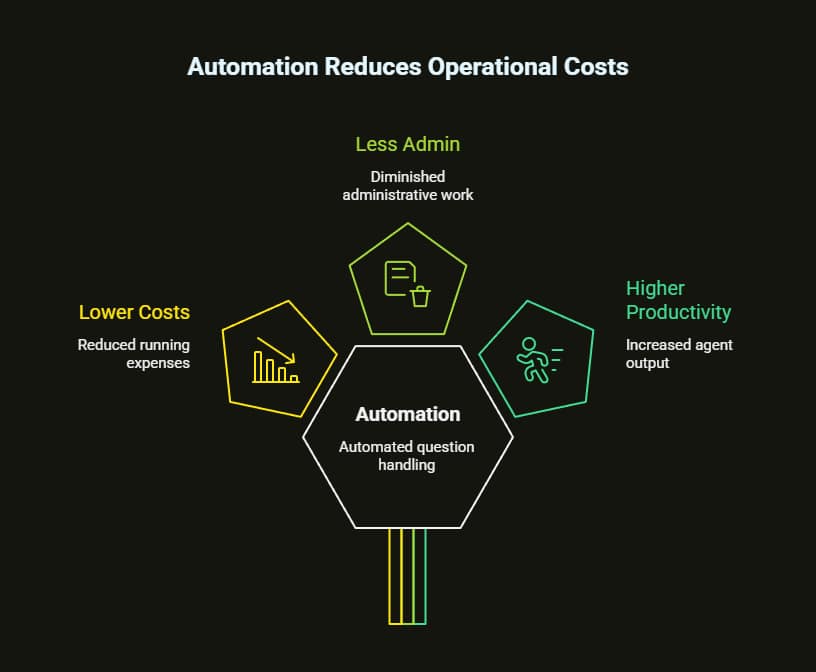
Calculating the Payback Period
Calculating the payback period of chatbots helps you understand their implementation feasibility. Most implementations of real estate chatbots get a positive R O I in between 8 and 14 months. The annual benefit exceeds this cost after the first year.
Implementation Challenges and Risk Mitigation
Deploying an AI chatbot in real estate can present challenges that require advanced preparation and planned risk management. In my many implementation experiences, I see the same challenges with the same mitigation.
Technical Integration Complexities.
It can be really hard to integrate an AI chatbot into legacy system software from the real estate industry. Many property management and CRM platforms are built on outdated architectures that do not support modern APIs or require custom integration development.
Mitigation Strategy
Before choosing a platform, a detailed technical assessment should be done regarding the integration and legacy support. Middleware solutions that allow data exchange between two incompatible systems.
Inconsistencies can arise between the chatbot’s response and the actual property information due to issues with data synchronization. Real-time synchronization becomes critical for accuracy.
Mitigation Strategy
Create automated data validation and re-synching processes regularly. Make sure that there is a backup procedure that routes customers to agents when there is a data mismatch.
Privacy and Compliance Concerns
Chatbot deployments must comply with data protection regulations like GDPR, CCPA, and others specific to certain industries. Businesses in the real estate sector handle sensitive financial and personal information that must be carefully protected.
Mitigation Strategy
Create clear and detailed privacy policies regarding data collection by the chatbot and usage of the same. Use encryption for data transmissions and storage, and allow users to opt out easily.
It is complicated to manage consent when chatbots collect info across conversations and interfaces. Clear procedures for obtaining consent must be set up and maintained.
Mitigation Strategy
Create clear consent processes that explain the use of data and give control over data sharing. Renew consent regularly and withdraw easily for continued compliance.
User Adoption and Acceptance Challenges
When clients resist using AI, it can limit the chatbot’s effectiveness for users who prefer or do not trust AI.
Mitigation Strategy
Help users understand who your chatbot is and why it will help them. Design the conversational flows that feel human, beneficial, and not robotic or disturbing.
When staff believe that chatbots will threaten their jobs rather than enhance their productivity, it can undermine implementation success.
Mitigation Strategy
Chatbots should enhance agents, not replace their role. Prepare adequate training that will display how AI assistance enhances agent performance as well as job satisfaction.
Quality Control and Brand Protection
If a chatbot gives wrong answers or doesn’t sound professional, it can create inconsistency. This can hurt brand reputation.
Mitigation Strategy
Create complete guidelines and an approval process for content. Make it a habit to regularly audit your content, analyze your users’ feedback to quickly locate quality issues.
Inappropriate Escalation happens when chatbots try to resolve issues that need a human touch.
Mitigation Strategy
Establish distinct criteria for escalation and train chatbots to know when to ask for human help. Set up handoff procedures so conversations can continue.
The Future of Real Estate AI: Emerging Trends and Market Evolution
The landscape of real estate AI chatbots is evolving quickly, with more innovative technologies ready to change business processes. When I look at how the industry develops, I see things that will happen.
Autonomous Agent Capabilities.
Real estate AI Chatbots of the future may show autonomous decision-making capability much beyond what current chat interfaces can do. Gartner predicts that 40% of enterprise applications will feature task-specific AI agents by 2026, up from less than 5% in 2025.
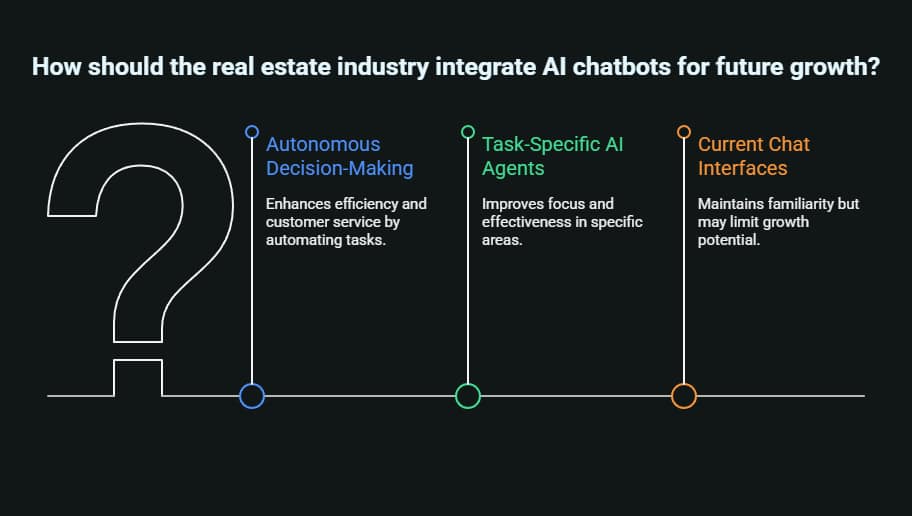
Transaction Processing Automation will enable chatbots to handle entire property transactions from initial inquiry through closing documentation. These autonomous agents will coordinate with multiple parties and collect documents, and ensure its comply with the documents comply with the legal obligations.
Chatbots will use market analysis and pricing intelligence to deliver real-time market analysis as well as competitive pricing recommendations and investment opportunities based on data analysis.
Personalization and Predictive Intelligence
Chatbots will predict customer needs based on their previous interactions, demographics, and market trends. This is called Behavioral Pattern Recognition. These systems will recommend properties, suggest optimal transaction timings, and provide bespoke market insights.
Your ability to manage a client relationship across multiple transactions, property transactions, referrals, and life planning, rather than only on the transactions themselves.
Integration with Smart Building Technologies
IoT Property Management has a strategy to integrate AI chatbots with the smart systems of buildings, which will allow better monitoring of properties, allow for predictive maintenance, and provide tenant services. Chatbots will be employed by tenants to take charge of the building systems and access amenities, as well as report issues.
AI will be used in Environmental and Energy Optimization.
Embracing the Future of Real Estate with AI Chatbots
AI chatbots are paving the way for a transformation in the real estate industry. Property businesses are automating tenant communication and lead qualification, giving personalized property recommendations, and scheduling appointments using bots, which is optimizing their operations, reducing costs, and improving customer experience.
Many early adopters are already achieving measurable benefits such as faster response times, higher lead conversion rates, and scaling with staff. As AI technology becomes more advanced through the use of predictive analytics, multilingual support, voice integration, and connectivity to the Internet of Things, the property management industry can expect smarter and more responsive property options.
If you’re in real estate, the takeaway is clear: adopting AI chatbots isn’t just an option; it’s a must. To stay competitive, property businesses should integrate these tools into their daily operations and leverage opportunities within an increasingly digital market to create unique client experiences.



